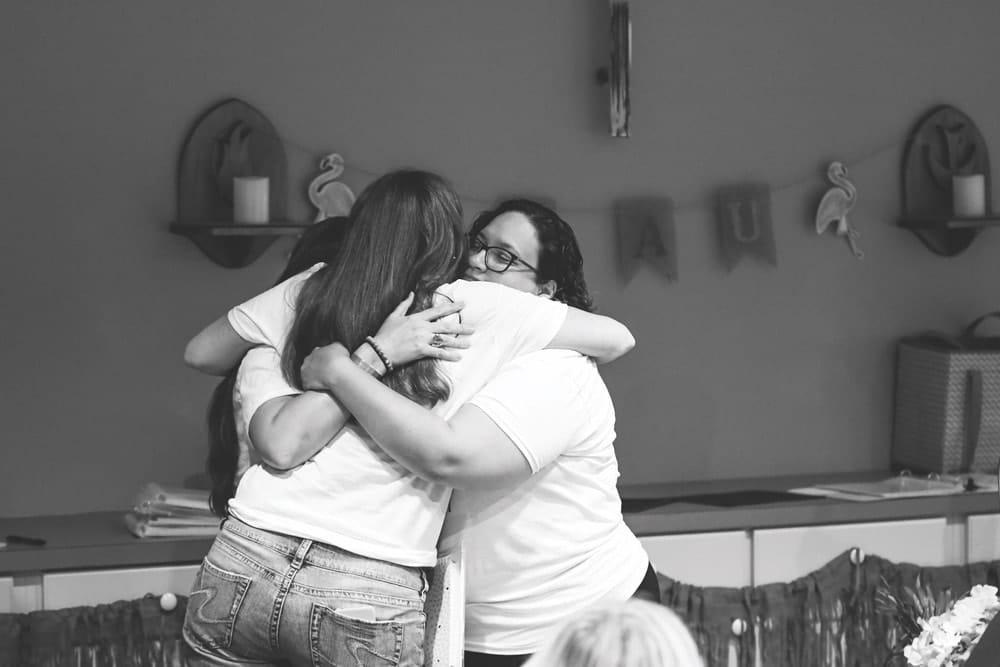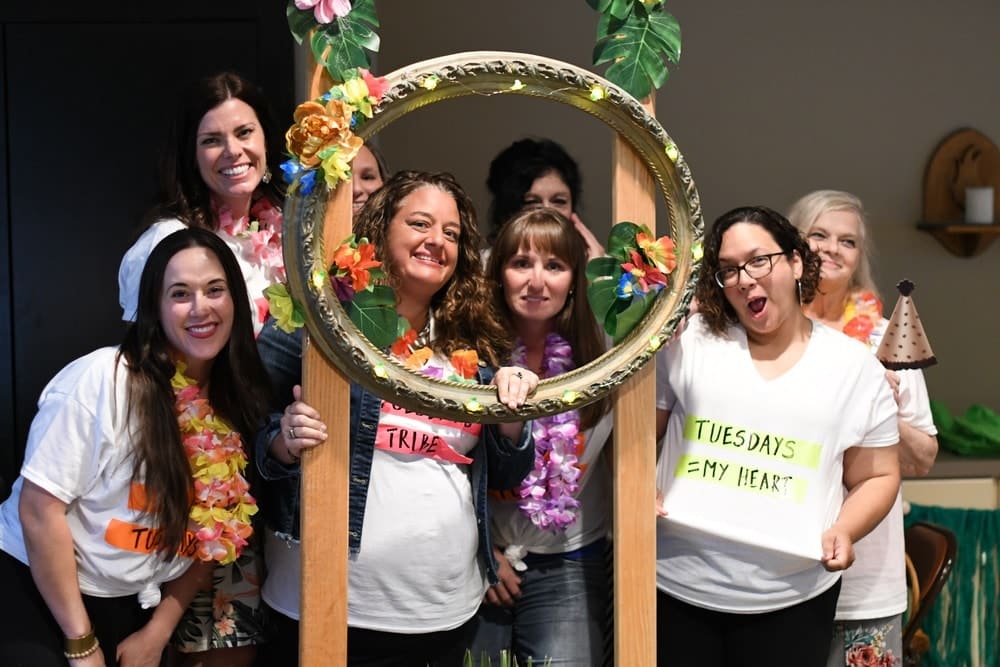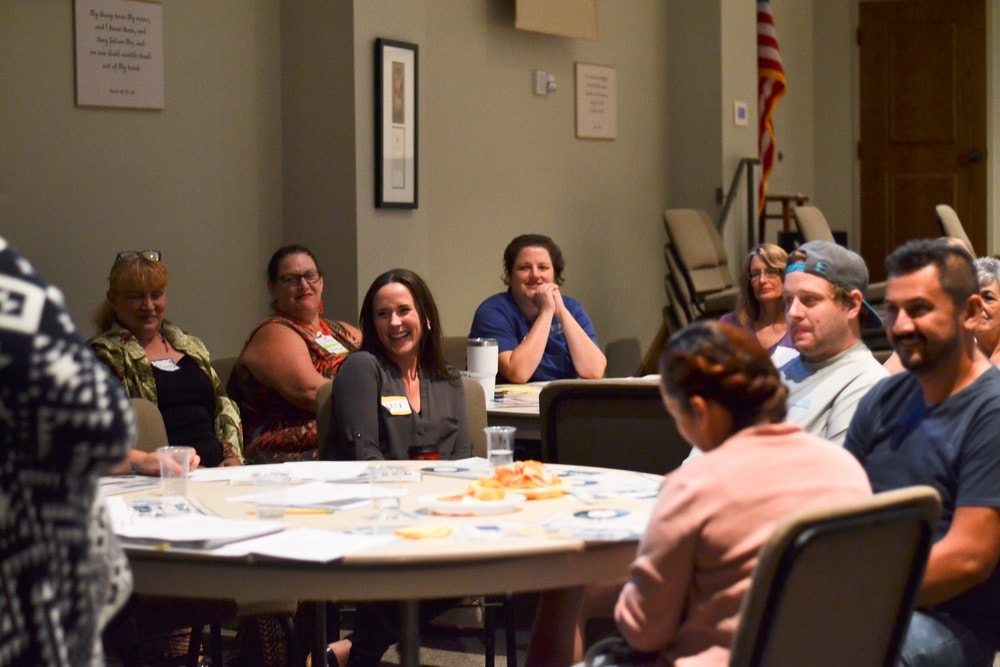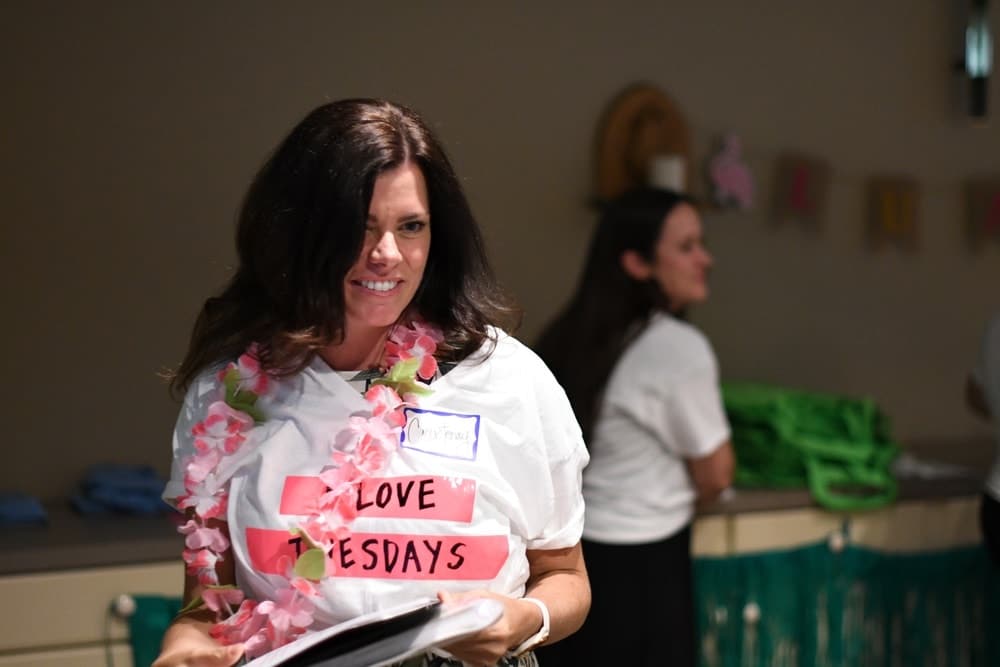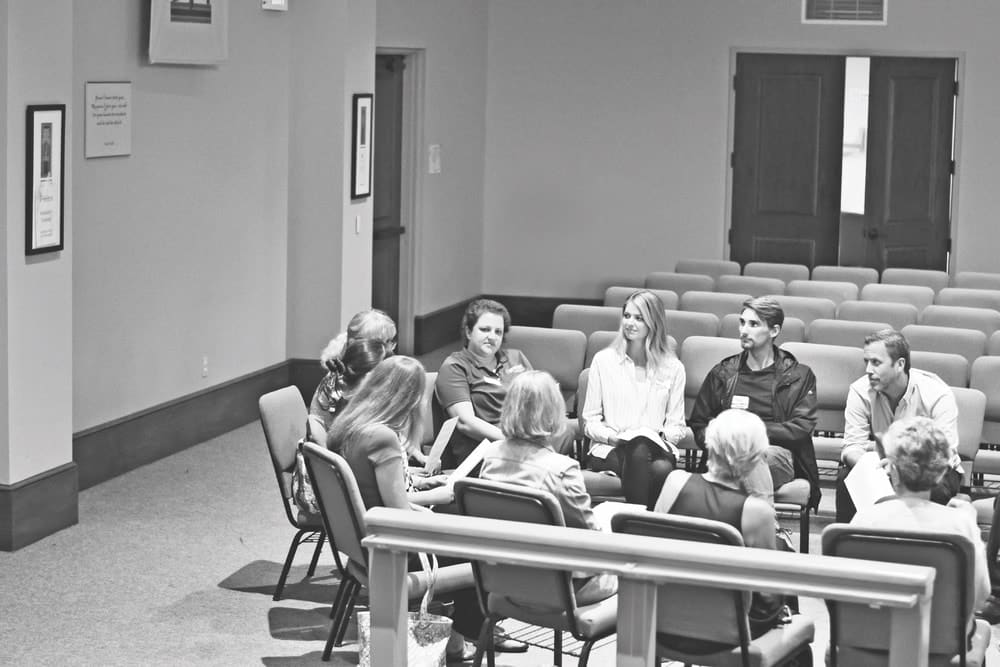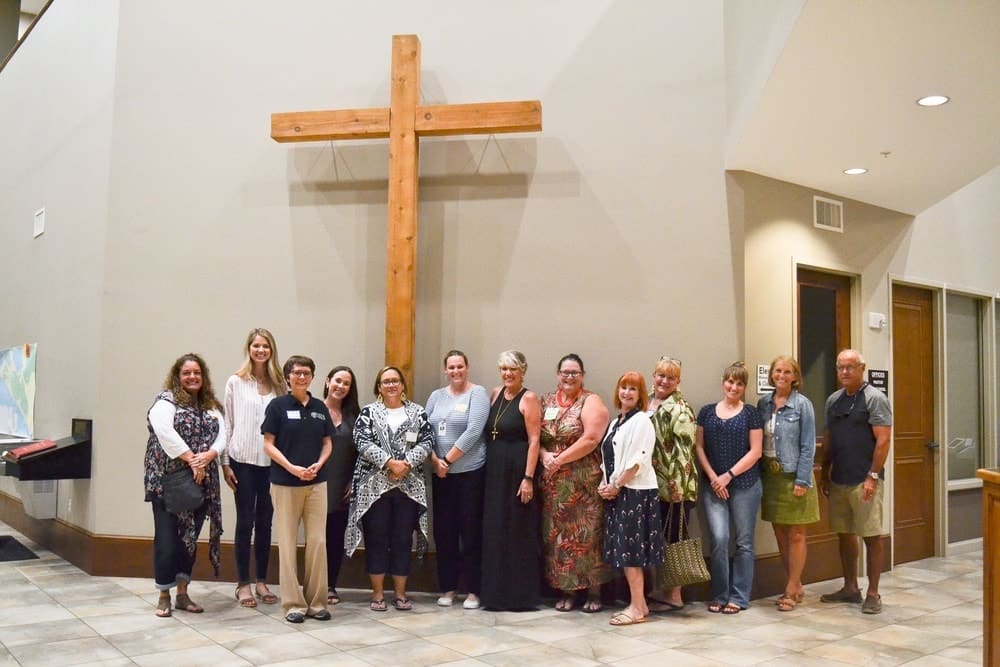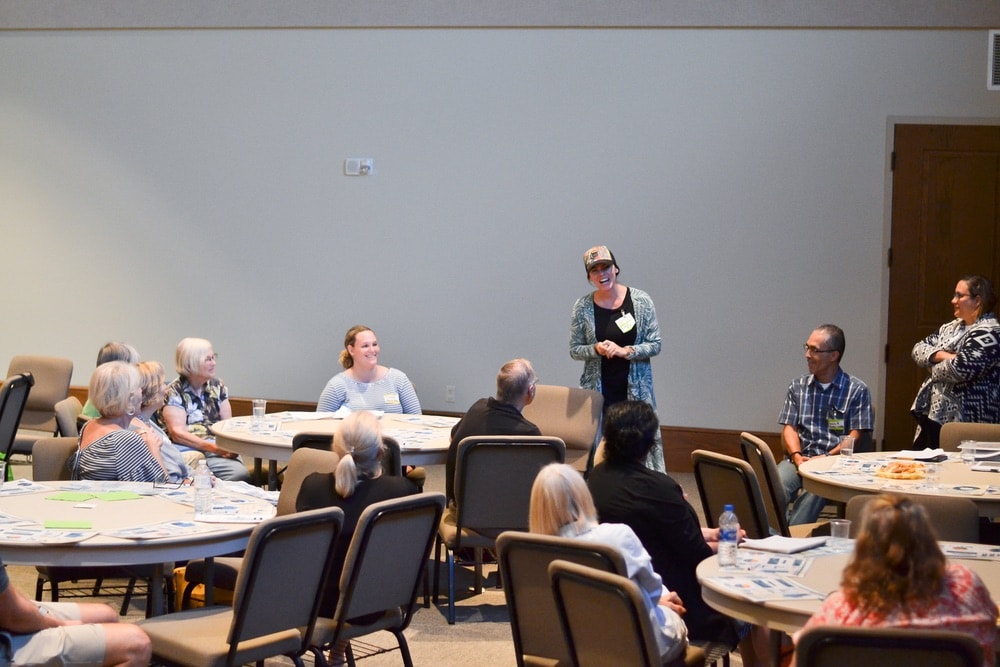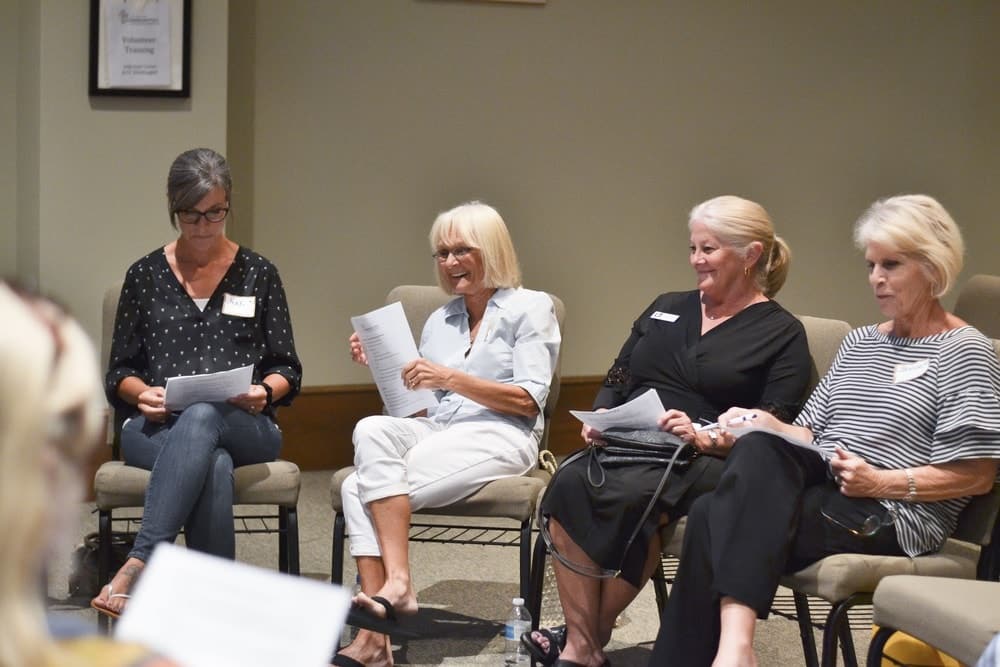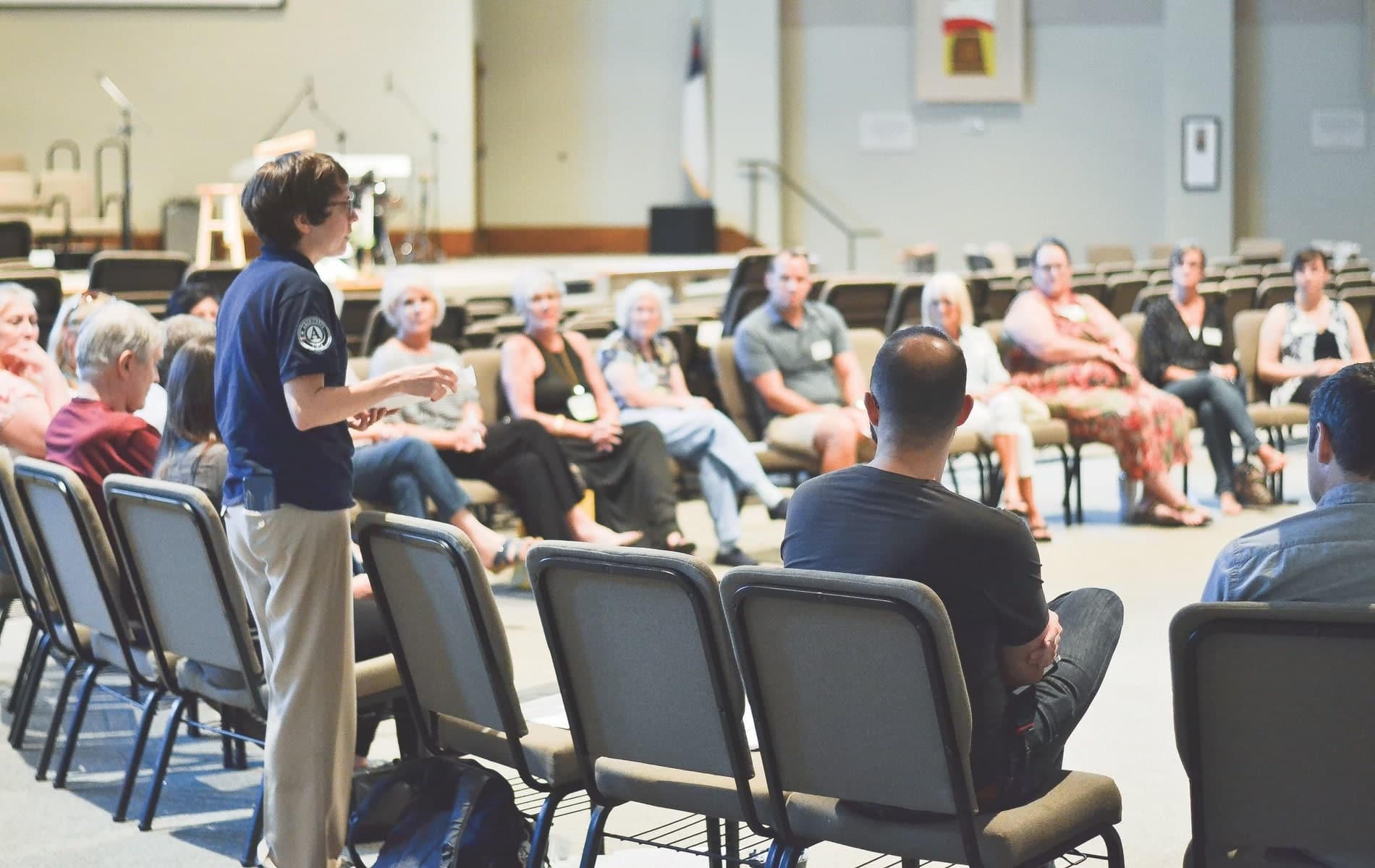
vie-magazine-communities-of-transformation-hero-min
Communities of Transformation leaders are dedicated to taking the church into the community and building bridges across racial, economic, social, and cultural boundaries. Members receive support and guidance with a variety of topics such as banking and debt management, building strong relationships, earning college degrees, and securing jobs.
The Ripple Effect
Helping Families Thrive
By Erica Averion and Emily Proctor | Photography courtesy of Communities of Transformation
Here are three statistics to consider:
- Sixty years ago, the average dinner time was ninety minutes. Today, it is less than twelve minutes. A national survey done by Eckrich some years ago revealed nearly half of American families ate dinner together fewer than three times a week or not at all.
- Research by Shelly Gable and Jonathan Haidt, published by the American Psychological Association, suggests that we actually have three times more positive experiences than negative and that discussing positive experiences and good news leads to heightened well-being, increased overall life satisfaction, and even more energy.
- According to Professor Norihiro Sadato, the study lead and professor at the National Institute for Physiological Sciences in Japan, “To the brain, receiving a compliment is as much a social reward as being rewarded money. We’ve been able to find scientific proof that a person performs better when they receive a social reward after completing an exercise. Complimenting someone could become an easy and effective strategy to use in the classroom and during rehabilitation.”
What do these statistics about families sitting down at the dinner table, giving compliments, and sharing good news have in common? They are all reasons to pay attention to a relatively new and growing not-for-profit organization in Alabama and Florida called Communities of Transformation.
The mission of Communities of Transformation (COT) is to move families from surviving to thriving by developing personal leadership skills and building authentic relationships. From its initial launch in 2013, COT has grown to include ten sites—nine in Alabama (Brewton, Dothan, Eufaula, Evergreen, Mobile, Montgomery, Phenix City, Pine Hill, and Selma) and, as of March 2019, one in Santa Rosa Beach (South Walton), Florida.
- Communities of Transformation leaders are dedicated to taking the church into the community and building bridges across racial, economic, social, and cultural boundaries. Members receive support and guidance with a variety of topics such as banking and debt management, building strong relationships, earning college degrees, and securing jobs.
- Communities of Transformation leaders are dedicated to taking the church into the community and building bridges across racial, economic, social, and cultural boundaries. Members receive support and guidance with a variety of topics such as banking and debt management, building strong relationships, earning college degrees, and securing jobs.
- Communities of Transformation leaders are dedicated to taking the church into the community and building bridges across racial, economic, social, and cultural boundaries. Members receive support and guidance with a variety of topics such as banking and debt management, building strong relationships, earning college degrees, and securing jobs.
- Communities of Transformation leaders are dedicated to taking the church into the community and building bridges across racial, economic, social, and cultural boundaries. Members receive support and guidance with a variety of topics such as banking and debt management, building strong relationships, earning college degrees, and securing jobs.
Each site, with its own local leadership team and in partnership with local 501(c)(3) not-for-profit organizations and churches, meets weekly, offering dinner, a program, and childcare to anywhere from twenty to fifty volunteers and participants. After dinner, attendees circle up to share their “good news,” and the evening concludes with each person receiving a compliment or “affirmation” from someone else. Classes and programming are designed to nurture healthy, supportive relationships, increase self-awareness, and equip individuals to set and achieve their life goals. After an initial twelve-week “Awaken” class or volunteer training program, relevant programming continues while everyone continues to receive support and encouragement in “matched groups” consisting of one to two Awaken graduates and three to four volunteers.
One thing that distinguishes Communities of Transformation from other “helping” initiatives in our community, many of which are transactional in nature, is its philosophy. For its Awaken curriculum and essential practices, Communities of Transformation partners with Think Tank, Inc., a not-for-profit whose mission is to “alleviate poverty by equipping communities to embrace mind-sets and practices that restore the social fabric of society” (ThinkTank-Inc.org). At Think Tank and COT, poverty is defined holistically, with reference to five interconnected dimensions: spiritual, relational, physical, intellectual, and financial. Attention is paid to the impact of individual choices, life circumstances beyond one’s control, and systemic challenges and injustices. Volunteer training utilizes resources such as Toxic Charity by Robert Lupton and When Helping Hurts by Steve Corbett and Brian Fikkert. At the heart of it all is the importance of relationships.
For me (Erica), as a volunteer and a member of the leadership team in South Walton, Communities of Transformation is a place where, no matter what the celebrations or challenges are in your life, there is an abundance of authentic people open and willing to meet you exactly where you are and support you. Need a friend? A break and a deep breath around a dinner table once a week? Help with brainstorming how best to accomplish a dream or goal? A mentor? Guidance on how to navigate a new or difficult season in life? You can find it at Communities of Transformation, where more is caught than taught.
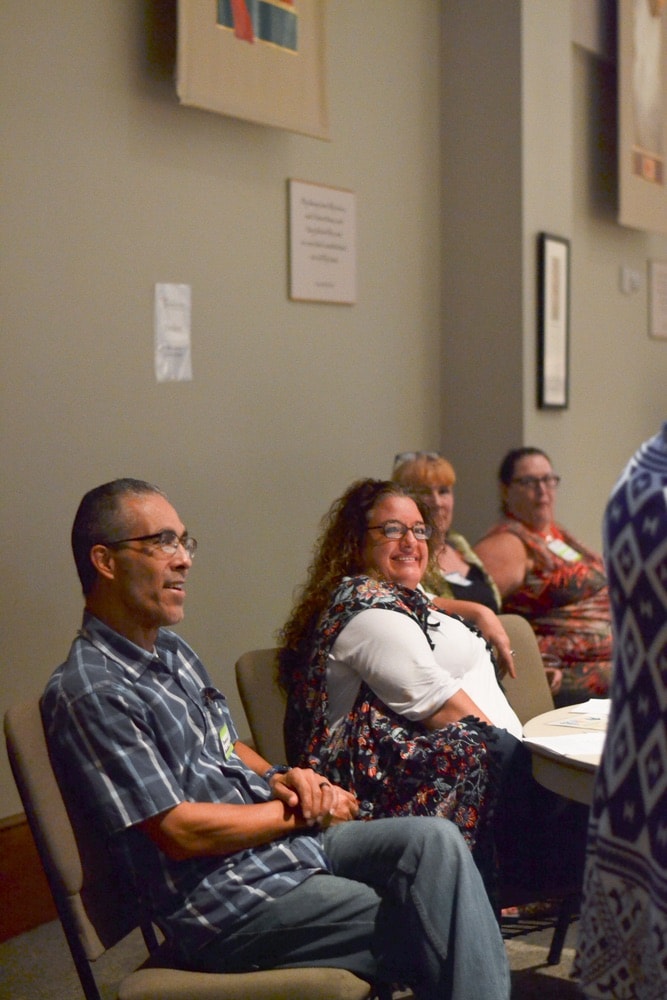
Communities of Transformation leaders are dedicated to taking the church into the community and building bridges across racial, economic, social, and cultural boundaries. Members receive support and guidance with a variety of topics such as banking and debt management, building strong relationships, earning college degrees, and securing jobs.
On any given Tuesday night at COT, we may sit at the table with a public health graduate student, a single mom struggling to make ends meet, a woman in recovery, a teacher’s aide and education enthusiast, a new grandma, and a retired small business owner. There may be three or four different churches represented and an agnostic. And the more we get to know each other, the more we begin to admire and learn from one another.
Is it always sunshine and rainbows? No, because these are real, authentic relationships built in a diverse community. We try to be honest with ourselves and with each other. We practice vulnerability. We all have strengths, but we all have growth areas as well. But is it one of the best things to ever happen to me? Yes. For many of us, COT is starting to feel an awful lot like family—in a good way.
But don’t just take my word for it. In the words of a recent Awaken graduate in South Walton: “the model teaches people to be leaders in their own lives, which in turn creates a positive domino or ripple effect in the community.” In effect, we are creating the change we wish to see in the world, starting with ourselves and fanning outward, one relationship at a time.
- The mission of Communities of Transformation is to move families from surviving to thriving by helping them develop personal leadership skills and build authentic relationships. Chapters hold weekly meetings and programs in communities throughout South Alabama and Northwest Florida.
- Communities of Transformation leaders are dedicated to taking the church into the community and building bridges across racial, economic, social, and cultural boundaries. Members receive support and guidance with a variety of topics such as banking and debt management, building strong relationships, earning college degrees, and securing jobs.
- Communities of Transformation leaders are dedicated to taking the church into the community and building bridges across racial, economic, social, and cultural boundaries. Members receive support and guidance with a variety of topics such as banking and debt management, building strong relationships, earning college degrees, and securing jobs.
- Communities of Transformation leaders are dedicated to taking the church into the community and building bridges across racial, economic, social, and cultural boundaries. Members receive support and guidance with a variety of topics such as banking and debt management, building strong relationships, earning college degrees, and securing jobs.
When the site coordinator in South Walton, Florida, Emily Proctor, was asked what she has found to be most true about Communities of Transformation, she responded with this: “What I have come to learn is that Communities of Transformation is the kind of place where no one gives up on you. Simply put, it’s the kind of place where we each hang in there with each other and with ourselves until true transformation happens. It was a not-to-be-missed opportunity for our local partner Caring and Sharing of South Walton, which had long provided relief for families in crisis but, until now, offered no clear path to self-sufficiency and thriving.”
— V —
If you are interested in learning more about Communities of Transformation, supporting this organization financially, or starting a similar program in your community, visit CommunitiesofTransformation.org or contact the conference director, Katy Wrona, at katywrona.cot@gmail.com.
Erica Averion lives in South Walton, Florida, with her husband, Carl. She was the cofacilitator for Communities of Transformation’s first Awaken participant class in Florida. She is an advocate, speaker, writer, and communications strategist who lives in the solution and focuses on the underdog. Her life’s work is centered on social impact and social responsibility for those with criminal backgrounds, and she’s especially passionate about restorative justice and trauma-informed care. Visit EricaAverion.com to learn more.
Emily Rose Proctor is a pastor and poet who grew up vacationing in Santa Rosa Beach, Florida, where she now lives with her husband, Richard, and their two young children. In addition to serving as the site coordinator for Communities of Transformation, she also serves part-time as the SoWal Community Chaplain (SoWalChaplain.org) and preaches monthly to the “Metho-Bapterians” at Red Bay Presbyterian Church. Emily is an alumna of Williams College and Columbia Theological Seminary in Decatur, Georgia.
Communities of Change
A poem by Susannah Wright
Scrooge had a very bad night
And was changed the very next day;
Not to contradict Mr. Dickens,
But change doesn’t happen that way.
Everything goes through changes:
Every living thing on this earth—
From a drop of water from the sky
To an animal that has just given birth.
As human beings, we desire change
Whether we admit to it or not.
When we have curly hair, we want it straight;
When we’re cold, we would rather be hot!
You can choose to make changes—
A change of mind or a change of heart.
No matter what change you need to make,
Starting is the hardest part.
Some changes are inevitable;
Like the caterpillar to a butterfly,
We also go through metamorphosis
As the years go by.
Your eyes are the only parts of you
That do not change as you grow up;
Remember this as you decide
To drink from the “things can’t change” cup.
The good news about change
Is that it’s completely up to you;
No one can make you change a thing
Unless you want that change too.
The process of change is more like a circle
Than it is one straight and final line,
Which means that, if it gets to be too much,
You can try again at any time.
My advice to you is this:
Take baby steps. Start small.
Remember, as a child
Before you ran, you had to crawl.
From my own personal experience,
Change is not an easy thing to do;
But the best part about change is
It’s completely up to you.
Share This Story!
KEEP UP WITH THE LATEST STORIES FROM VIE



